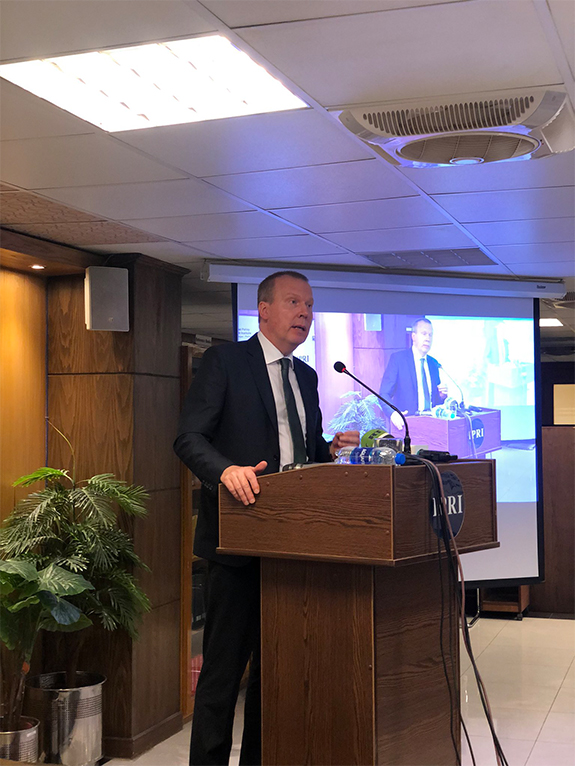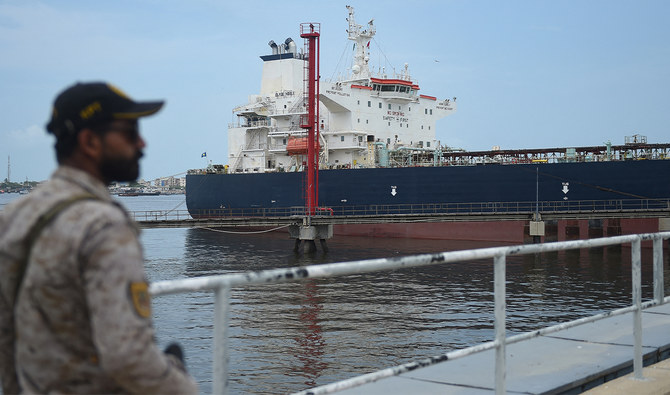ISLAMABAD: Russian Ambassador to Pakistan Danila Ganich said on Wednesday his country wanted to continue crude oil supplies to Pakistan and negotiations were underway to decide on pricing and other modalities.
Pakistan imported 100,000 tons of discounted Russian crude oil under a government-to-government (G2G) deal signed between Islamabad and Moscow early this year as Islamabad explores the diversification of its energy imports at cheaper rates. Pakistan plans to meet 20 percent of its oil requirement from Russia. Energy imports make up the majority of the country’s external payments.
“As far as oil is concerned, we are ready to continue our deliveries and supplies to Pakistan,” Ganich said during a lecture on Pakistan-Russia relations organized by Islamabad-based think tank the Islamabad Policy Research Institute.
“Because you understand that we are under sanctions and all talks are confidential and they confidentially discuss the mode of payment and the exact price and other parameters of the deal.”

Russian Ambassador to Pakistan Danila Ganich is pictured addressing during a lecture on Pakistan-Russia relations organized by Islamabad Policy Research Institute in Islamabad, Pakistan on September 13, 2023. (Photo courtesy: @IPRI_Pak/Twitter)
He said “commercial deliberations” were on as Pakistan and Russia had different pricing demands.
“I hope that everything will be fine, and we will find some common ground and we will continue to trade,” Ganich said.
Responding to a question on the UN-brokered Black Sea grain deal aimed at easing a global food crisis, the envoy said the deal fell apart due to a lack of commitment on the part of Western nations.
The Black Sea grain initiative was negotiated in July 2022 between Turkiye, the UN and Russia as a way of ensuring that Ukraine, one of the breadbaskets of the world, could ensure that its grain could leave its southern ports via the Bosphorus. The grain could not be exported in the quantities required using the alternative methods of road or rail through Poland or by canal and river through Romania.
Turkiye was involved due to the close relationship between its president, Recep Tayyip Erdoğan, and Vladimir Putin and because under the Montreux convention signed in 1936 it oversees maritime traffic in the Bosphorus and Dardanelles straits.
Russia pulled out of the deal in July this year. The west claims Putin thought the deal was not worth preserving since it was allowing Ukrainian coffers and farmers to benefit from its grain exports. Russia had been saying for months that conditions for the deal’s extension had not been fulfilled by Western countries.
“We implemented our part of the deal for over a year but the other side failed in doing that and just fed us with nice words,” Ganich said, adding that Russia would resume its part of the deal when the West decided to implement its promises.
“They promised that we will be reconnected with the SWIFT international payment network and we were promised that there will be no obstacles in the way of exports of our grain and fertilizers but nothing was implemented,” he added.
Russian banks were cut off from the SWIFT international payment network by the European Union in June 2022 over Russia’s invasion of Ukraine.
Speaking about bilateral relations, Ganich said Pakistan was Russia’s “friend and partner,” and both countries needed to enhance bilateral trade and investment.
“We have excellent prospects in building up our economy but right now our trade is very modest, which is around $700 million a year. Therefore, we got to do much more, and we have and we can do much more,” he said.
Speaking about changes in the policies of “new Russia compared to communist Russia,” the envoy said Moscow wanted to have balanced relations with both India and Pakistan.
“Believe me, we are trying, we are learning to have relations with our dear friend Pakistan independently of our relations with third countries. Pakistan is also significant because it’s a reputable Islamic state.”












